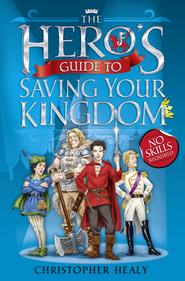
Полная версия:
The Hero’s Guide to Saving Your Kingdom


Dedication
For Dashiell and Bryn, my heroes

Title Page
Dedication
Map of the Kingdoms
PROLOGUE: Things You Don’t Know About Prince Charming
1. Prince Charming Misplaces His Bride
2. Prince Charming Defends Some Vegetables
3. Prince Charming Claims He Is Not Afraid of Old Ladies
4. Prince Charming Loses Some Fans
5. Prince Charming Is the Worst Person in the World
6. Prince Charming Has No Sense of Direction
7. Prince Charming Has No Idea What’s Going On
8. Prince Charming Is Afraid of the Dark
9. Prince Charming Is a Wanted Man
10. Prince Charming Annoys the King
11. Prince Charming Takes a Dive
12. Prince Charming Hugs Trees
13. Prince Charming Is Completely Unnecessary
14. Prince Charming Falls Flat
15. Prince Charming Should Not Be Left Unsupervised
16. Prince Charming Meets a Piece of Wood
17. Prince Charming Still Has No Idea What’s Going On
18. Prince Charming Gets Battered and Fried
19. Prince Charming Needs a Bath
20. Prince Charming Walks into a Bar
21. Prince Charming Joins a Gang
22. Prince Charming Is a Sneak
23. Prince Charming Takes the Wrong Seat
24. Prince Charming Hates Children
25. Prince Charming Really Needs to Figure Out What’s Going On
26. Prince Charming Gives Up
27. Prince Charming Gets Good News and Bad News
28. Prince Charming Is Doomed
29. Prince Charming Does Exactly What He Said He’d Never Do
30. Prince Charming Almost Saves the Day
31. Prince Charming Gets Just What He Thinks He Wanted
EPILOGUE: Prince Charming Goes Where Everybody Knows His Name
ACKNOWLEDGMENTS
Copyright
About the Publisher
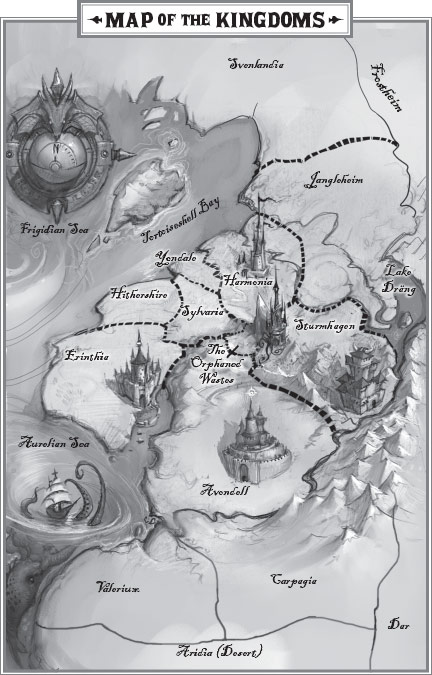
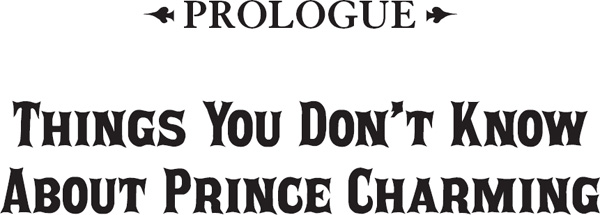
Prince Charming is afraid of old ladies. Didn’t know that, did you?
Don’t worry. There’s a lot you don’t know about Prince Charming: Prince Charming has no idea how to use a sword; Prince Charming has no patience for dwarfs; Prince Charming has an irrational hatred of capes.
Some of you may not even realize that there’s more than one Prince Charming. And that none of them are actually named Charming. No one is. Charming isn’t a name; it’s an adjective.
But don’t blame yourself for your lack of Prince Charming–based knowledge; blame the lazy bards. You see, back in the day, bards and minstrels were the world’s only real source of news. It was they who bestowed fame upon people. They were the ones who sculpted any hero’s (or villain’s) reputation. Whenever something big happened—a damsel was rescued, a dragon was slain, a curse was broken—the royal bards would write a song about it, and their wandering minstrels would perform that tune from land to land, spreading the story across multiple kingdoms. But the bards weren’t keen on details. They didn’t think it was important to include the names of the heroes who did all that damsel rescuing, dragon slaying, and curse breaking. They just called all those guys “Prince Charming.”
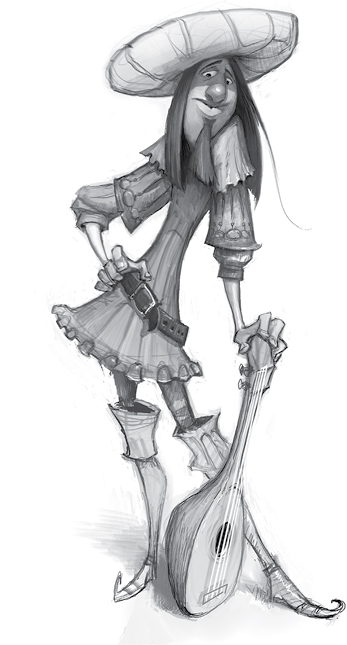
It didn’t even matter to the bards whether the person in question was a truly daring hero (like Prince Liam, who battled his way past a bone-crushing, fire-blasting magical monster in order to free a princess from an enchanted sleeping spell) or some guy who merely happened to be in the right place at the right time (like Prince Duncan, who also woke a princess from a sleeping spell, but only because some dwarfs told him to). No, those bards gave a man the same generic name whether he nearly died (like Prince Gustav, who was thrown from a ninety-foot tower when he tried to rescue Rapunzel) or simply impressed a girl with his dancing skill (like Prince Frederic, who wowed Cinderella at a royal ball).
If there was anything that Liam, Duncan, Gustav, and Frederic all had in common, it was that none of them were very happy about being a Prince Charming. Their mutual hatred of that name was a big part of what brought them together. Not that teaming up was necessarily the best idea for these guys.
If we were to peek ahead to, say, Chapter 20, we would see our heroes in a small mountain town called Flargstagg, sitting in just about the worst tavern in all of creation: the Stumpy Boarhound. The Stumpy Boarhound is the kind of dank and miserable place where pirates and assassins play cards while plotting their next despicable crimes (which often involve robbing the tavern itself). It’s not the type of place where you would expect to find even one Prince Charming, let alone four. And yet, in Chapter 20, there they all are: Liam, bruised and soot-stained, with fish bones in his hair; Gustav, in charred and dented armor, massaging his bald, bright red scalp; Frederic, covered with enough dirt to make you think he’d just crawled out of a grave; and Duncan, with a big bump on his forehead, and wearing . . . is that a nightshirt? Oh, and there are about fifty armed thugs surrounding their table, all of whom seem eager to smash the princes into paste.
Of course, by Chapter 20, you can’t fault the princes for looking like wrecks. They’re lucky to be alive after their run-ins with the witch, the giant, the bandits, the—well, you’ll see. Basically, the fact that they’re about to get into a major brawl is none too surprising, considering the kind of week these princes have just had. But we’re getting ahead of ourselves.
Before we reach that turning-point night at the Stumpy Boarhound, we need to head back to the peaceful kingdom of Harmonia, where the whole adventure—or mess, depending on whom you ask—began. We have to go back to when Prince Frederic managed to lose Cinderella.
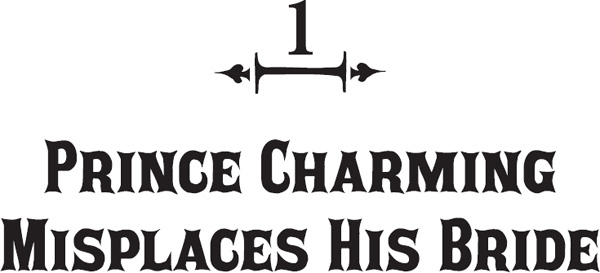
Frederic wasn’t always helpless. There was a time when he aspired to become a hero. But it seemed it wasn’t meant to be.
From the moment he was born—and immediately placed into the delicate swishiness of a pure silk bassinet—Prince Frederic led a life of comfort. As heir to the throne of the very wealthy nation of Harmonia, he grew up with an army of servants standing ready to pamper him in every way imaginable. While learning to crawl, he was fitted with lamb’s-wool knee pads to keep his baby-soft skin from getting scuffed. When he wanted to play hide-and-seek, butlers and valets would hide in the most obvious places—behind a feather, under a napkin—so that the boy wouldn’t have to work too hard to find them. Pretty much anything young Frederic could have wanted or needed was handed to him on a silver platter. Literally.
The only thing Frederic had to do in return was live the life of a proper gentleman. He was allowed to attend as many poetry readings, ballroom dances, and twelve-course luncheons as he wanted. But he was forbidden to take part in any activity that could be considered remotely risky or dangerous. Appearances were very important to Frederic’s father, King Wilberforce, who vowed that no one in his family would ever again suffer the cruel mockery that had been heaped upon his great-grandfather, King Charles the Chicken-Pocked. “Not a scar, not a bruise, not a blemish” was the motto of King Wilberforce. And he went to extreme measures to keep his son away from anything that might give him so much as a scratch. He even had Frederic’s pencils pre-dulled.
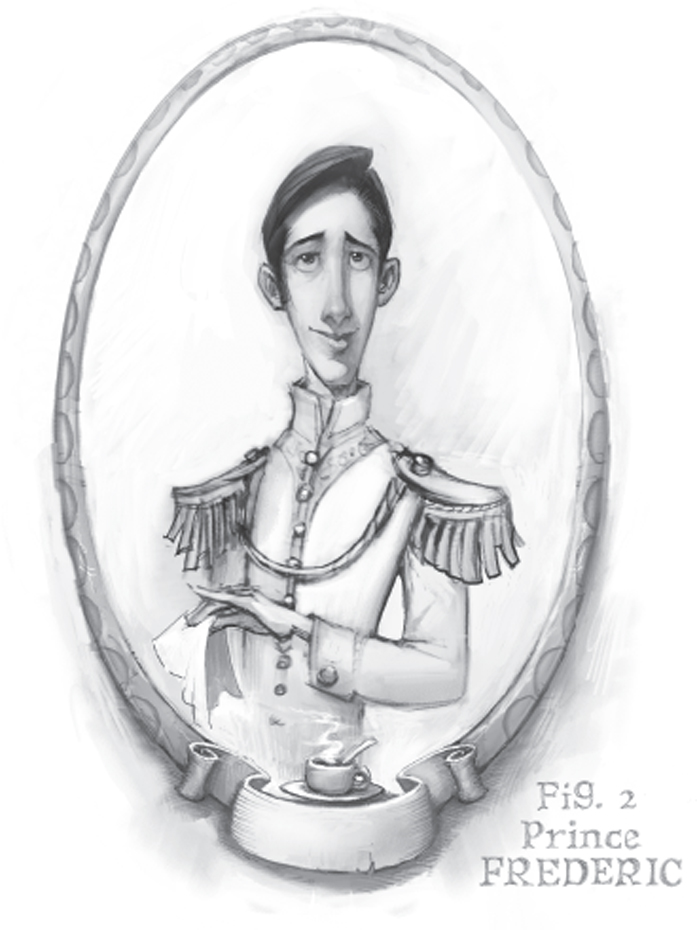
For most of his early years, Frederic was perfectly happy to skip out on pastimes like tree climbing (twisted ankles!), hiking (poison ivy!), or embroidery (pointy needles!). King Wilberforce’s warnings about the hazards of such endeavors sank in good and deep.
But at the tender age of seven, Frederic was inspired to try something daring. He was in his private classroom, being taught to write his name with fancy curlicue letters, when a commotion down the hall caused his tutor to cut the lesson short. Frederic followed his tutor down to the palace gates, where many of the servants had gathered to gawk at a visiting knight.
The old warrior, who was battered and exhausted from a recent bout with a dragon, had staggered up to the palace seeking food and shelter. The king invited the weary visitor inside. This was the first knight Frederic had ever seen in real life (and frankly, even the ones he’d read about in books weren’t very exciting—his favorite bedtime story was Sir Bertram the Dainty and the Quest for the Enchanted Salad Fork). During the knight’s short stay, a fascinated Frederic followed him everywhere, listening to his tales of ogre battles, goblin wars, and bandit chases. There was a look in the man’s eyes that Frederic had never seen before. Frederic could sense the knight’s thirst for thrills, his yearning for action. The knight was a man who thrived on adventure the way Frederic thrived on tea cakes.
That evening, after the knight departed, Frederic asked his father if he could take sword-fighting lessons. The king dismissed his request with a smile: “Swords are sharp, my boy. And I need a son with both ears attached.”
Young Frederic was undaunted. The next day, he asked his father if he could take a shot at wrestling instead. King Wilberforce shook his head. “You’re what they call petite, Frederic. You’d have your spine snapped in an instant.”
The day after that, Frederic requested a spot on the jousting team. “That’s more dangerous than the other two combined,” the king moaned disapprovingly. “You’ll be skewered like a cocktail weenie.”
“Archery?” Frederic asked.
“Eyes: poked out,” the king insisted.
“Martial arts?”
“Bones: broken.”
“Mountaineering?”
“Eyes broken. Bones poked out.”
By the end of the week, King Wilberforce couldn’t take it anymore. He needed to put a stop to Frederic’s thrill-seeking dreams. He decided to set his son up for a fall.
“Father, can I try spelunking?” Frederic asked eagerly.
“Cave exploration? You’ll fall into a bottomless pit,” the king chided. Then he changed his tone. “But you can try animal training if you’d like.”
“Really?” Frederic was stunned and thrilled. “You mean with wild animals? Not hamsters or goldfish?”
The king nodded.
“You don’t think I’ll be eaten alive?” Frederic asked.
“Oh, I fear that you will, but if you’re so determined to put your life at risk, perhaps I shouldn’t stand in your way,” his father said, weaving his deception.
The next day, with his heart racing, Frederic was led down a winding basement corridor to a storeroom in which all the old coats of arms, spare scepters, and crates of outgrown baby clothes had been shoved up against the walls to make room for an enormous cage. Inside that cage: a pacing, panting tiger. The animal let out a low growl as soon as it saw the young prince.
“Wow, I didn’t know we’d start with something so big,” Frederic said, considerably less eager than he had been a minute earlier.
“Are you ready for this, Your Highness?” the animal’s trainer asked. Frederic barely had time to nod before the trainer slid back the bolt and let the cage door fall open. The trainer uttered a quick word to the tiger, and the big cat burst out into the room, rushing straight at Frederic.
Frederic screamed and ran. The giant tiger, easily three times his size, dashed after the boy. Frederic darted among the crates of tarnished goblets and out-of-tune lutes, looking for someplace to hide. “Why aren’t you stopping it?” he shouted at the trainer.
“I can’t stop it,” the trainer replied. “It’s a wild animal. Your father told you this would be dangerous.”
Frederic ducked under a heavy wooden table, but the tiger swatted it away as if it were nothing more than a piece of dandelion fluff. Frederic scrambled across the floor in an attempt to get away from the beast, but was soon backed up against a stack of rolled tapestries. There was nowhere left for him to go. With tears running down his face, Frederic shrieked as he saw the tiger’s open mouth coming at him.
When the tiger snatched him up into its maw, Frederic was too terrified to realize that the animal had no teeth. The big cat calmly carried the limp, weeping boy back to its cage and set him down gently on the floor—which is what it had been carefully trained to do. For this was no ordinary tiger: This was El Stripo, the talented and cooperative star of the Flimsham Brothers Circus. The Flimshams were famous for their visually horrifying—but impressively safe—act in which El Stripo’s trainer would stuff the tiger’s mouth with up to five infants from the audience and then instruct the animal to spit them back to their mothers. The babies almost always landed in the correct laps.
It took Frederic a few seconds to realize he hadn’t been eaten. At which point his father appeared. Frederic ran into the king’s arms, burying his wet face in his father’s royal robes.
“Do you see now?” the king asked. “Do you see why I say you can’t do these things?” Behind Frederic’s back, he flashed El Stripo’s trainer a thumbs-up.
King Wilberforce’s plan had worked. The prince was so deeply frightened by his experience with the tiger, so chilled to the core, that he never asked to try anything daring again. Father was right, he thought; I am not cut out for such bold escapades.
Fear ruled Frederic from that moment on. He even found a few Sir Bertram the Dainty stories to be a little too scary.
Instead Frederic focused his energies on taking etiquette lessons, putting together stylish outfits, and becoming exactly the kind of prince his father wanted him to be. And he became pretty darn good at it. In fact, he began to love it. He was proud of his excellent posture, his artful flower arranging, and his flawless foxtrot.
More than a decade passed before the thought of adventure found its way back into Frederic’s mind. It happened on the night of the big palace ball, at which it was hoped that Frederic would find a bride (he never left the palace, so this type of event was the only way for him to meet girls). Among the dozens of elegant women at the ball that night, there was one girl who caught Frederic’s attention immediately—and it wasn’t just because she was beautiful and elegantly dressed. No, she had something else: a daredevil gleam in her eyes. He’d seen that look only once before—in that old knight all those years ago.
Frederic and the mystery girl had the time of their lives dancing together. But at midnight she ran off without a word.
“Father, I have to find that girl,” insisted Frederic, newly inspired and feeling a bit more like his seven-year-old self again.
“Son, you’ve never been outside the palace gates,” the king replied in a foreboding tone. “What if there are tigers out there?”
Frederic shrank away. That tiger episode had really done a number on him.
But Frederic didn’t give up entirely.
He instructed his trusted valet, Reginald, to find the mystery woman for him. It turned out that Ella (that was her name) wasn’t a noblewoman at all; just a sooty cleaning girl. But her story—the way she mixed it up with a fairy and used magical means to escape her wicked stepfamily—intrigued Frederic (even if he hoped he’d never have to meet any of her relatives).
When he told his father he wanted to marry Ella, the king sputtered in surprise. “I thought I’d fixed you, but apparently I didn’t,” the king scowled. “You don’t get it at all, do you? An ill-bred wife would destroy your image more than any scar or broken limb ever would.”
Up until that point, Frederic had always believed that the king enforced strict rules because he feared for his son’s safety. But now he saw that wasn’t necessarily the case. So, for the first time, Frederic stood up to his father.
“You do not rule me,” he stated firmly. “Well, technically you do, being as you’re the king. But you do not rule my heart. My heart wants Ella. And if you don’t bring her here to be with me, I will go to her. I don’t care how dangerous it is out there. I would ride a tiger to get to her if I had to.”
In truth, Frederic was utterly intimidated by the thought of venturing out into the real world. If his father refused to meet his demands, he had no idea if he would be able to follow through on his threat. Luckily for him, the king was shocked enough to give in.
And so, Ella came to live at the palace. She and Frederic were officially engaged to marry, and the tale of the magical way in which the couple met became the talk of the kingdom. Within days, the minstrels had a new hit on their hands, and the tale was told and retold across many realms. But while the popular version of the story ended with a happily-ever-after for Prince Charming and Cinderella, things didn’t go as smoothly for the real Frederic and Ella.
Ironically, it was Ella’s bold and venturesome spirit—the very thing that Frederic found so attractive about her—that came between them. Ella’s dreadful stepmother had treated her like a prisoner in her own home and forced her to spend nearly every waking hour performing onerous tasks, like scrubbing grout or chipping congealed mayonnaise from between fork tines. While Ella suffered through all this, she dreamed of a more exhilarating life. She fantasized about riding camels across deserts to search ancient temples for magic lamps, or scaling cloud-covered peaks to play games of chance with the rulers of hidden mountain kingdoms. She honestly believed that anything could happen in her future.
When Ella met Frederic at the ball, it was the climax of a day filled with magic and intrigue, and she assumed it was the beginning of a nonstop, thrill-a-minute existence for her. But life with Frederic was not quite what she’d expected.
Frederic tended to sleep in. Sometimes until lunch. And he’d often spend over an hour grooming himself to his father’s specifications. By the time Ella finally saw him each day, she would be more than ready for some sort of excitement. But Frederic usually suggested a more subdued activity, like picnicking, listening to music, or quietly admiring some art.
Don’t get me wrong: Ella enjoyed all those things—for the first few days. But by the fourteenth picnic, she began to fear that those same few activities were all she was ever going to do at the palace. Her unchanging routine made her feel uncomfortably like a prisoner again. So one morning, she decided she would speak frankly with Frederic about what she needed.
That morning, as usual, Frederic slept late. When he eventually got up, he spent fifteen minutes (pretty quick for him) browsing a closet filled with ultra-fancy suits, before finally deciding on a crisp white outfit trimmed with gold braiding and tasseled shoulder pads. The five minutes after that were dedicated to straightening his short, light-brown hair. Unfortunately, a few stubborn strands refused to stay in place, and so the prince did what he did whenever he got frustrated:
“Reginald!”
Within seconds, a tall, slender man with a thin, pointy mustache popped into the prince’s bedroom. “Yes, milord?” he asked in a voice stiff enough to match his rigid posture.
“Good morning, Reginald,” Frederic said. “Can you fix my hair?”
“Certainly, milord,” Reginald said, as he grabbed a silver brush and began using it to tidy the prince’s bed head.
“Thank you, Reginald,” Frederic said. “I’m off to see Ella, and I want to look my best.”
“Of course, milord.”
“I think I’m going to have Cook surprise her with breakfast in bed.”
Reginald paused. “I’m reasonably sure, milord, that the young lady has already eaten breakfast.”
“Drat,” muttered the prince. “So it’s happened again. How long ago did she wake up?”
“About three hours ago,” Reginald replied.
“Three hours! But I asked you to wake me when Ella got up.”
“I’m sorry, milord,” Reginald said sympathetically. “You know I’d love to help you. But we’re under strict orders from the king: Your beauty sleep is not to be disturbed.”
Frederic burst from his seat, waving away Reginald’s brush. “My father ordered you not to wake me? He’s still trying to keep me and Ella apart.”
He rushed to the door of his bedroom, then quickly back to the mirror for one last check of the hair, and then out and down the hall to look for his fiancée.
Ella wasn’t in her room, so Frederic headed to the gardens. He paused briefly to sniff a rosebush, when he heard the sound of approaching hoofbeats. He looked over his shoulder to see that a large white horse was bearing down on him, tearing through the garden at a fast gallop, leaping over one hedgerow after another. The prince tried to run, but the golden tassels of his jacket caught on the shrub’s thorns.
Frederic tugged frantically at his stuck sleeve as the horse’s rider pulled up on the reins and brought the steed to a halt. From the saddle, Ella looked down at him and laughed. She wore a distinctly unfancy blue dress, and her tied-back hair was disheveled from the ride. Her strong, athletic build and warm, healthy glow were a stark contrast to Frederic’s slender frame and sun-deprived complexion. “I hope you haven’t been stuck there all morning,” she said, only half joking.
“No, this just happened,” Frederic said, relieved. “I don’t suppose you could possibly hop down and lend me a hand?”
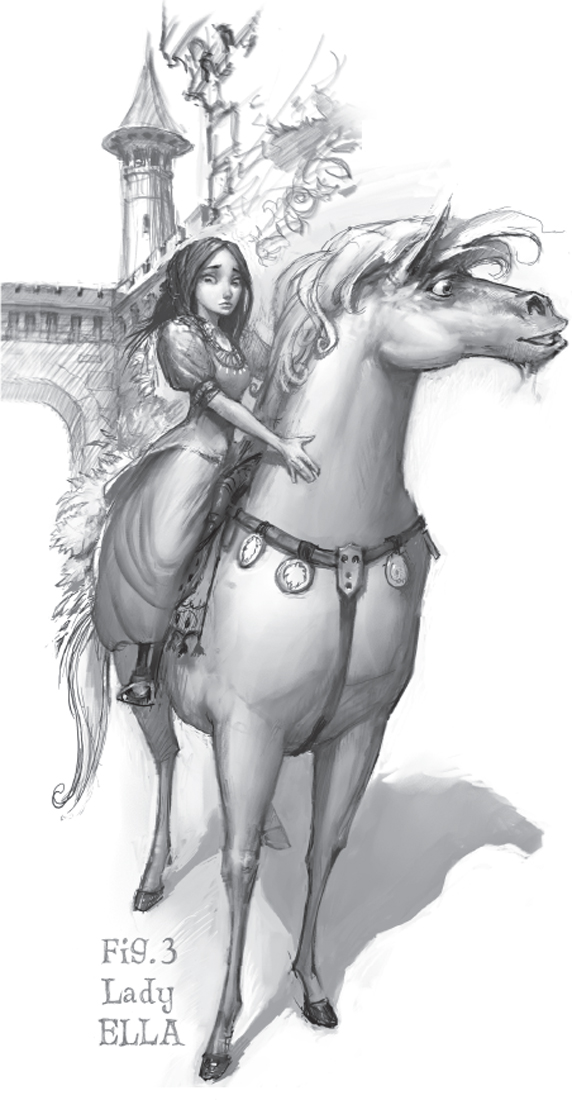
Ella slid off the saddle, patted her horse’s nose, and crouched down to help free the prince’s jacket from the thorns. “I told you those tassels would get you into trouble someday,” she said.
“But they’re what all the most fashionable noblemen are wearing these days,” Frederic said brightly.
He brushed himself off and struck a chest-out, hands-on-hips pose to show off his outfit. He hammed it up to get a laugh out of Ella. It worked.
“Very nice,” Ella said with a chuckle. “I’d love to see you up on a horse sometime,” she hinted, petting her mare’s pink nose.
“Yes, I’m sure I’d look positively heroic up there,” Frederic said. “It’s a shame I’m allergic to horsehair.” He wasn’t allergic; he was afraid of falling off.
“A terrible shame,” Ella sighed.
“I didn’t realize you knew how to ride,” Frederic said. “Considering the way your stepmother kept you under lock and key, I wouldn’t have thought you had much time for equestrian lessons.”
“I didn’t,” Ella said. “Charles, your head groom, has been teaching me these past few weeks. I usually practice in the mornings, while you . . . um, while you sleep.”
Frederic changed the subject: “So, have you heard the song that Pennyfeather wrote about you? That bard of ours certainly has a way with a quill. The song is very popular, I hear. Supposedly, the minstrels are singing it as far as Sylvaria and Sturmhagen. Before you know it, you’ll be more famous than me. Or even more famous than Pennyfeather. Though I don’t really like the fact that he called you Cinderella. Makes you sound dirty and unkempt.”



